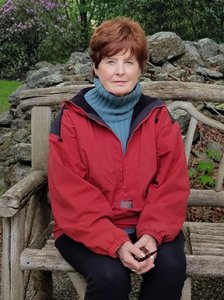Pam Bernard: Three Poems

Feature Poet:
Pam Bernard
HOW CIRCUMSTANCE
When you go away the wind clicks around to the north.
—W.S. Merwin
As if no other god could alter his decision
the neighbor’s cat loped across the darkening yard,
a young female cardinal clamped tight
in his jaws, and the argument that had
begun to boil between us stopped.
You had been looking at the freshly mown field,
your afternoon’s struggle, and I at you, trying
to find a way to say what I’ve never been able to—
that our long marriage had come undone.
Backlit by the hemlock you were
taking in the day’s last saturated light,
the kind that makes trees seem to glow
from within, light I’d tried many times
to paint, but always failed to in the end.
Soon the bats would be careening above us,
fragile, endangered, their welcome presence
the one thing we would agree upon.
But when your face recorded what you saw—
before I turned to see—you took on the demeanor
of a small boy, hurt so deeply you were beyond
child reason, whose mother left him for
a vaudeville clown who knew how to please,
a boy who loved to gather walnuts
from under the tree, fingers stained for days.
And though you caught the cat and didn’t
wring its neck, and saved the bird, which
showed up miraculously at the feeder
the next day lopsided but otherwise unhurt—
before it was all put into motion so irrevocably, so
without mercy, I was about to say I’d given up on us.
How circumstance can save us from catastrophe,
loneliness seeping back to where it lives
on a moor deep in the belly, while the walnuts
come fresh, as if from the tree again, and a boy
awakened from the honey of sleep
walks steadily toward us.
FIELD NOTES
All I have is my voice
to undo the folded lie.
—W. H. Auden
i
Tall grass feathering cool
between my fingers, field
blazing in late summer heat.
A gathering of willow, catkins
scattered among the understory.
A loud drumming, then
a ruffed grouse bursts suddenly
into the wavy air, where it hovers,
wings beating wildly—
ii
Fog lowers its skirts over the speckled
murmuration, smudges the tops
of Norway spruce, as the starlings
roost high above winged branches.
Who can believe their grace?
Impossibly precise, a whirling throng
above these crooked fields, the spent corn,
reed bed where the marsh harrier,
leopard moth and rove beetle
thrive, where the dobsonfly
crawls out of a watery cradle to emerge
into its gauzy, membranous self.
iii
The remembering trees, their fierce
loneliness through the long winter
an act of faith. Deep within them,
beyond reason or plan, flow rivers
of amber, while the trees
hold still in their long patience
and the waiting goes on.
What I have longed for to be past, is not—
the sad work of children
paying for what they do not owe.
iv
Where is the covenant we promise them,
where the safe harbor?
But for the trees, who
will heed their cries?
Held in their taproots, voices
of the children so sweet
even the junipers, flung out
into the wilderness, hear.
IMAGO MUNDI
after Borges
Perhaps the oldest map of the world—
two concentric circles incised
on a clay tablet, and between them
the cosmic ocean.
Within the innermost circle, seven
named cities, three unnamed, all
revealed in cuneiform.
Salt sea, a river of bitter water.
Mountains, swamp, canal.
Babylon at the center.
Below, parallel lines represent
the southern marshes,
a curved line the Zagros.
Seven triangles radiate from
the outermost circle. Representing
islands, they surround the known
regions, and are named by
degrees of brightness.
The islands are a mythical realm
fusing our earthly domain to the heavens
engraved on the tablet’s reverse—
stars and constellations, all
that could be imagined.
And because the prevailing orientation
was dictated by the four winds,
and because the goddess Ishtar
deemed northwest most favorable,
the map is thusly inclined.
Yet it proclaims itself to be a mere
representation of a map lost
to time and memory—a map, perhaps,
of such exactitude, it was a map
of an empire the size of an empire,
or a map that so distorted the world
the poles went on, in pure theory, forever.
Pam Bernard is a poet, painter, editor, and an adjunct professor of writing at Franklin Pierce University. Her awards include a National Endowment for the Arts Fellowship in Creative Writing, two Massachusetts Cultural Council Fellowships, a MacDowell, and the Pablo Neruda and Grolier Prizes. TriQuarterly, Barrow Street, Prairie Schooner, Cimarron Review, and Nimrod are among the journals within which her work has been published. Of four published books, three are full-length collections of poetry. Among them, Across the Dark was a finalist for the National Poetry Series. Her latest is a novel-in-verse, entitled Esther, published by CavanKerry Press.